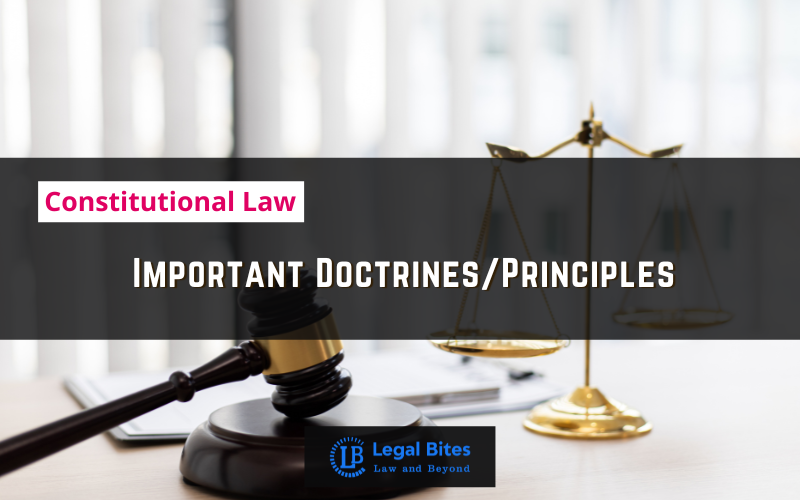Discuss the scope of the "Freedom of Speech and Expression". Does it include freedom of press? .....
Find the answer to the mains question of Constitutional Law only on Legal Bites.;

Question: Discuss the scope of the "Freedom of Speech and Expression". Does it include freedom of press? Is it an absolute right? [MPJS 2021] Find the answer to the mains question of Constitutional Law only on Legal Bites. [Discuss the scope of the "Freedom of Speech and Expression". Does it include freedom of press? Is it an absolute right?]AnswerThe right to freedom of speech and expression is enshrined under Article 19(1)(a) of the Constitution of India. This right plays a vital role...
Question: Discuss the scope of the "Freedom of Speech and Expression". Does it include freedom of press? Is it an absolute right? [MPJS 2021]
Find the answer to the mains question of Constitutional Law only on Legal Bites. [Discuss the scope of the "Freedom of Speech and Expression". Does it include freedom of press? Is it an absolute right?]
Answer
The right to freedom of speech and expression is enshrined under Article 19(1)(a) of the Constitution of India. This right plays a vital role in promoting democracy by ensuring that individuals can freely express their opinions, ideas, and criticisms. It allows for the exchange of ideas and fosters an environment conducive to public debate and discussion, which is essential for the functioning of a healthy democracy.
Meaning and Scope
Freedom of speech and expression encompasses the right to express one's views through various means, including speech, writing, print, digital platforms, pictures, or any other communicative medium. It includes:
- Right to Express: The individual’s right to express thoughts and beliefs freely, without censorship.
- Right to Information: The right to access and disseminate information, allowing people to stay informed.
- Right to Silence: The right not to speak or to refrain from expression.
- Artistic Freedom: Freedom to express through music, literature, painting, and other forms of art.
This right also implies the freedom to discuss or criticize government policies, debate public issues, and engage in intellectual dialogue. However, this freedom, while extensive, is not without its limits.
Freedom of Press
While the Indian Constitution does not explicitly mention "freedom of the press," the Supreme Court has consistently held that freedom of speech and expression also includes the freedom of the press. This means the press enjoys the same rights as citizens to disseminate information, critique government actions, and report on matters of public interest. In Ramesh Thapar v. State of Madras (1950), the Supreme Court recognized the role of the press in informing the public and thereby enhancing the democratic process.
However, like individual freedom of speech, the press is also subject to the reasonable restrictions laid out in Article 19(2). The media must balance its rights with its responsibility not to violate the legal boundaries of public order, defamation, or national security. Instances such as sedition charges or restrictions on the publication of sensitive military or governmental information highlight the limitations on press freedom.
Is Freedom of Speech and Expression an Absolute Right?
Freedom of speech and expression is not an absolute right. As outlined under Article 19(2), the government is empowered to impose reasonable restrictions in the following circumstances:
- Security of the State: The state can impose restrictions on speech that threatens the integrity and security of the nation. Speech that incites violence or promotes armed rebellion is not protected.
- Public Order: Any speech that disturbs public order or incites violence or unrest can be restricted. The landmark case of Kedar Nath Singh v. State of Bihar (1962) upheld that incitement to violence is a valid ground for restriction.
- Decency or Morality: Content that violates societal norms of decency or morality can be restricted. For instance, obscenity laws regulate the publication and dissemination of material that is considered offensive to public morality (Bobby Art International v. Om Pal Singh Hoon case, 1996).
- Contempt of Court: Speech that undermines the authority or dignity of courts can be restricted to maintain the rule of law and respect for judicial institutions.
- Defamation: Speech that harms the reputation of an individual is restricted under defamation laws. Balancing free speech with the right to dignity and reputation is essential in defamation cases.
- Incitement to an Offence: The state can prevent speech that incites people to commit criminal acts or disrupt the law and order situation.
- Friendly Relations with Foreign States: Speech that could harm India’s diplomatic relations with other countries can also be restricted.
The freedom of speech and expression is a cornerstone of democratic values and includes the freedom of the press, it is not an unrestricted right. The State can impose reasonable restrictions to maintain public order and safeguard national interests.
Important Mains Questions Series for Judiciary, APO & University Exams
- Constitutional Law Mains Questions Series Part-I
- Constitutional Law Mains Questions Series Part-II
- Constitutional Law Mains Questions Series Part-III
- Constitutional Law Mains Questions Series Part-IV
- Constitutional Law Mains Questions Series Part-V
- Constitutional Law Mains Questions Series Part-VI
- Constitutional Law Mains Questions Series Part-VII
- Constitutional Law Mains Questions Series Part-VIII
- Constitutional Law Mains Questions Series Part-IX
- Constitutional Law Mains Questions Series Part-X



